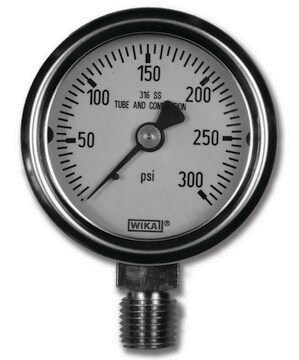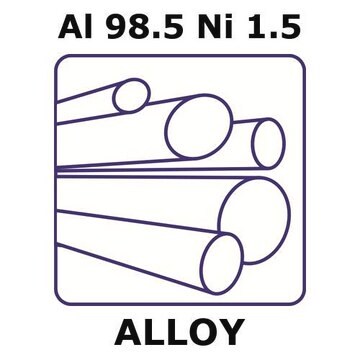GF04814951
Silicon
rod, 100mm, diameter 25mm, crystalline, 100%
Sinonimo/i:
Silicon, SI007940
Autenticatiper visualizzare i prezzi riservati alla tua organizzazione & contrattuali
About This Item
Formula condensata:
Si
Numero CAS:
Peso molecolare:
28.09
Numero MDL:
Codice UNSPSC:
12141911
ID PubChem:
NACRES:
NA.23
Prodotti consigliati
Saggio
100%
Stato
rod
Produttore/marchio commerciale
Goodfellow 048-149-51
L × diam.
100 mm × 25 mm
P. ebollizione
2355 °C (lit.)
Punto di fusione
1410 °C (lit.)
Densità
2.33 g/mL at 25 °C (lit.)
Stringa SMILE
[Si]
InChI
1S/Si
XUIMIQQOPSSXEZ-UHFFFAOYSA-N
Cerchi prodotti simili? Visita Guida al confronto tra prodotti
Descrizione generale
For updated SDS information please visit www.goodfellow.com.
Note legali
Product of Goodfellow
Scegli una delle versioni più recenti:
Certificati d'analisi (COA)
Lot/Batch Number
It looks like we've run into a problem, but you can still download Certificates of Analysis from our Documenti section.
Se ti serve aiuto, non esitare a contattarci Servizio Clienti
Possiedi già questo prodotto?
I documenti relativi ai prodotti acquistati recentemente sono disponibili nell’Archivio dei documenti.
Atteq ur Rehman et al.
TheScientificWorldJournal, 2013, 470347-470347 (2014-01-25)
The p-type crystalline silicon wafers have occupied most of the solar cell market today. However, modules made with n-type crystalline silicon wafers are actually the most efficient modules up to date. This is because the material properties offered by n-type
Dominique Collard
Frontiers in bioscience (Elite edition), 5, 955-965 (2013-06-12)
In modern life, technologies enabling detection of biological molecules at a low threshold, for health and ecological concerns, are in high demand. Directly interrogating the molecules is a promising direction to clarify the noisy response of conventional assays arising from
Jacob Raber et al.
Radiation research, 181(4), 362-368 (2014-03-29)
The space radiation environment consists of multiple species of high-energy charge particles (HZE), including (56)Fe and (28)Si nuclei, that may impact neuronal cells, but their damaging effects on the central nervous system (CNS) have been poorly defined. Hippocampus-dependent memory functions
Bomin Cho et al.
Journal of nanoscience and nanotechnology, 14(7), 4832-4836 (2014-04-25)
Asymmetric porous silicon multilayer (APSM)-based optical biosensor was developed to specify human Immunoglobin G (Ig G). APSM chip was generated by an electrochemical etching of silicon wafer using an asymmetric electrode configuration in aqueous ethanolic HF solution and constituted with
Timothy J Barnes et al.
Therapeutic delivery, 4(7), 811-823 (2013-07-26)
Porous silicon (pSi) is a nanostructured carrier system that has received considerable attention over the past 10 years, for use in a wide variety of biomedical applications, including biosensing, biomedical imaging, tissue scaffolds and drug delivery. This interest is due
Il team dei nostri ricercatori vanta grande esperienza in tutte le aree della ricerca quali Life Science, scienza dei materiali, sintesi chimica, cromatografia, discipline analitiche, ecc..
Contatta l'Assistenza Tecnica.


